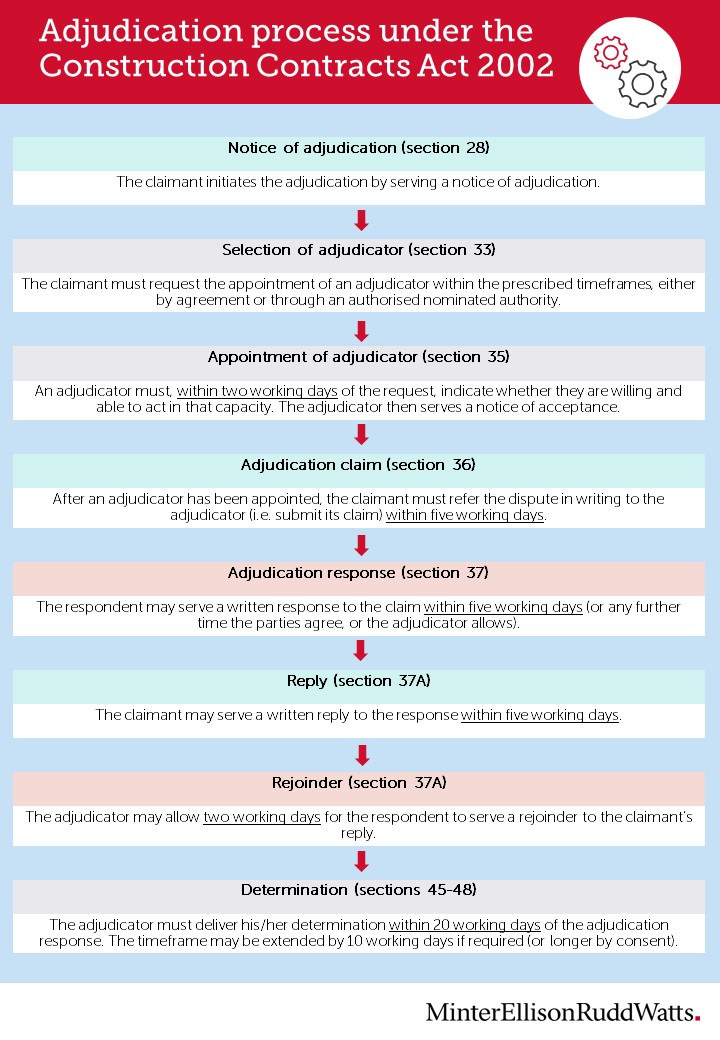In our first article, we looked at what adjudication is, the types of disputes that can be adjudicated, and reasons to use adjudication. In this article, we dive into the adjudication process, highlight practical considerations and summarise the relief available in adjudication. As the process is a statutory one under the Construction Contracts Act 2002 (CCA), it is generally prescriptive, but there are still opportunities to tailor the process to the particular dispute.
Adjudication process
The adjudication process is streamlined. As mentioned in our previous article, one of the key benefits of adjudication is speed: the entire process can take three to six months from start to finish.
The process is summarised in the below flowchart:

Practical considerations
The CCA is prescriptive and failure to comply with the mandatory requirements can be fatal to your claim or defence. We summarise below five key considerations to keep in mind.
The timeframes are tight and strict
Adjudication is fast paced, and compliance with the relevant timeframes is critical. Failure to serve the adjudication claim in time will bring the adjudication to an end. There is no ability for the adjudicator to extend the time for serving the adjudication claim. In practice, this means that the claimant will usually have prepared its adjudication claim before serving the notice of adjudication.
Similarly, an adjudicator is prohibited from having regard to a response to an adjudication claim unless it was served within time. An adjudicator may allow the respondent additional time to serve its response, and requests for extensions are common. Any extension should be sought as soon as possible and prior to the expiry of the response timeframe (five working days).
Parties may agree an adjudicator (or not!)
The parties may agree on an adjudicator. It is common (but not required) for the claimant to suggest a list of adjudicators from which the respondent may agree. In our experience, it is usually best to try to reach agreement on an adjudicator with the other party. This enables an adjudicator to be selected based on the skills and expertise the parties think is most appropriate for a particular dispute. Any agreement on the adjudicator prior to the dispute arising is not binding on the parties.
Appointment via an authorised nominating authority may be needed if agreement cannot be reached, or if the claimant wants to proceed quickly. An adjudicator must be appointed by an authorised nominating authority if a charging order is sought.
The adjudicator may require payment for security of fees
Often an adjudicator will require payment for security of his/her fees before issuing a notice of acceptance. Often, the claimant will pay the full security for fees in order to secure the appointment of the adjudicator without delay. An adjudicator may also require payment of his/her fees before releasing the determination. Liability for the adjudicator’s fees and expenses is then dealt with in the determination.
No provision for counterclaims
A respondent cannot raise a counterclaim in its response to the adjudication claim. To bring a ‘counterclaim’ in adjudication, the party must issue their own notice of adjudication. If two or more adjudication proceedings are pending, the CCA permits the adjudicator, with the consent of all parties, to determine those proceedings at the same time. In practice, if a respondent wants to issue its own adjudication, it will need to move very quickly after receiving the claimant’s notice of adjudication. It will need to weigh up the benefits of having the proceedings determined at the same time, against any disadvantages of preparing its own adjudication at speed (while also responding to the claimant’s adjudication).
An adjudicator can determine his/her own jurisdiction
If there is a dispute as to the jurisdiction of the adjudicator, this may be dealt with as a preliminary issue. It is up to the adjudicator whether to deal with the jurisdiction issue as a preliminary issue or as part of the overall determination. Dealing with the issue as a preliminary issue can have the advantage of avoiding the parties having to incur the full costs of the adjudication proceedings when the jurisdiction of the adjudicator is in question. Examples of preliminary issues include where it is disputed whether there is a construction contract between the parties or whether the claimant has initiated an adjudication against the wrong respondent.
Form and content of adjudication documents
The CCA prescribes the information that must be provided in the notice of adjudication – including setting out details of the dispute – and the notice must be accompanied by a statement of the respondent’s rights and obligations in the adjudication and a brief explanation of the adjudication process. Notices that fail to comply with the requirements in the CCA may be invalid. Disputes over the validity of a notice can delay the adjudication process or subsequent enforcement processes. A respondent should check that the notice of adjudication is compliant and raise any deficiencies early.
The Court has held that it is the adjudication claim, and not the notice of adjudication, that generally sets the scope of the adjudication. However, it is good practice (and avoids arguments about the claim differing from the notice) if the notice of adjudication correctly captures the claim that will be made.
There is no prescribed form for the substantive adjudication documents (i.e., claim, response, reply and rejoinder). In practice, each step is usually made up of evidence (fact and any expert evidence), submissions and an accompanying bundle of documents. The rules of evidence that apply to evidence in court do not apply to adjudication.
Where time permits hyperlinking the bundle of documents to the submissions can be helpful but there is no requirement to do this.
Available relief
An adjudicator may award monetary or declaratory relief. Monetary relief includes monies owed under the contract, under statute and includes damages. An adjudicator may also make declarations as to the rights and obligations of the parties under the contract, including determining differences of contractual interpretation.
If the respondent owns the construction site under the contract, the claimant can seek a charging order over this site. This is a key benefit of adjudication compared to other dispute resolution mechanisms, where charging orders can be sought but generally only as part of enforcement of judgment procedures.





